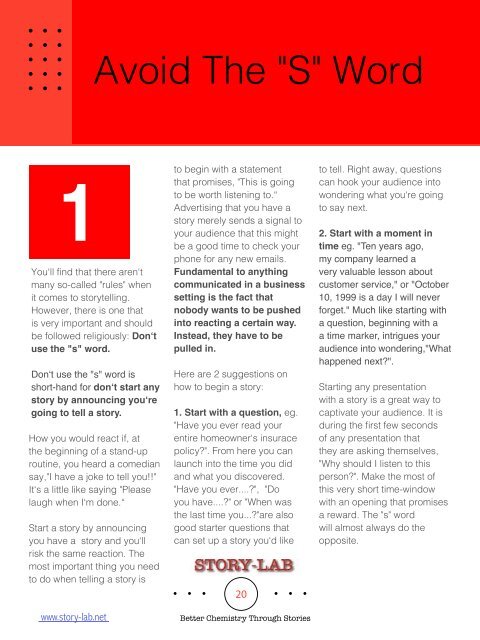Smart Guide To Storytelling For Leaders and Salespeople
Learn how storytelling can help you influence, inspire, and motivate people in business settings. Includes six specific storytelling methods you can use right away.
Learn how storytelling can help you influence, inspire, and motivate people in business settings. Includes six specific storytelling methods you can use right away.
Create successful ePaper yourself
Turn your PDF publications into a flip-book with our unique Google optimized e-Paper software.
Avoid The "S" Word<br />
1<br />
You‘ll find that there aren‘t<br />
many so-called "rules" when<br />
it comes to storytelling.<br />
However, there is one that<br />
is very important <strong>and</strong> should<br />
be followed religiously: Don‘t<br />
use the "s" word.<br />
Don‘t use the "s" word is<br />
short-h<strong>and</strong> for don‘t start any<br />
story by announcing you‘re<br />
going to tell a story.<br />
How you would react if, at<br />
the beginning of a st<strong>and</strong>-up<br />
routine, you heard a comedian<br />
say,"I have a joke to tell you!!"<br />
It‘s a little like saying "Please<br />
laugh when I‘m done.“<br />
Start a story by announcing<br />
you have a story <strong>and</strong> you‘ll<br />
risk the same reaction. The<br />
most important thing you need<br />
to do when telling a story is<br />
www.story-lab.net<br />
to begin with a statement<br />
that promises, "This is going<br />
to be worth listening to.“<br />
Advertising that you have a<br />
story merely sends a signal to<br />
your audience that this might<br />
be a good time to check your<br />
phone for any new emails.<br />
Fundamental to anything<br />
communicated in a business<br />
setting is the fact that<br />
nobody wants to be pushed<br />
into reacting a certain way.<br />
Instead, they have to be<br />
pulled in.<br />
Here are 2 suggestions on<br />
how to begin a story:<br />
1. Start with a question, eg.<br />
"Have you ever read your<br />
entire homeowner‘s insurace<br />
policy?". From here you can<br />
launch into the time you did<br />
<strong>and</strong> what you discovered.<br />
"Have you ever....?", "Do<br />
you have....?" or "When was<br />
the last time you...?"are also<br />
good starter questions that<br />
can set up a story you‘d like<br />
20<br />
Better Chemistry Through Stories<br />
to tell. Right away, questions<br />
can hook your audience into<br />
wondering what you‘re going<br />
to say next.<br />
2. Start with a moment in<br />
time eg. "Ten years ago,<br />
my company learned a<br />
very valuable lesson about<br />
customer service," or "October<br />
10, 1999 is a day I will never<br />
forget." Much like starting with<br />
a question, beginning with a<br />
a time marker, intrigues your<br />
audience into wondering,"What<br />
happened next?".<br />
Starting any presentation<br />
with a story is a great way to<br />
captivate your audience. It is<br />
during the first few seconds<br />
of any presentation that<br />
they are asking themselves,<br />
"Why should I listen to this<br />
person?". Make the most of<br />
this very short time-window<br />
with an opening that promises<br />
a reward. The "s" word<br />
will almost always do the<br />
opposite.


